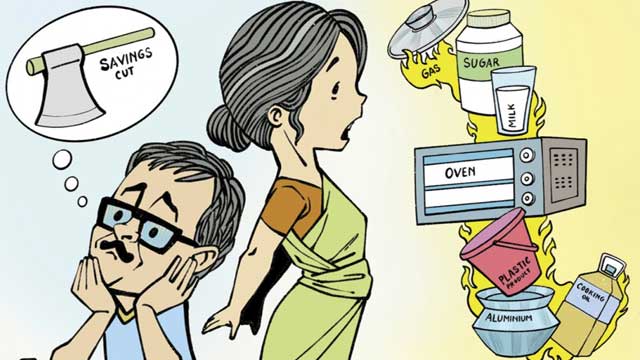Afsana Rahman’s maternity leave is about to end and so baby formula will soon become a sub-stitute for breast milk for her second child. As she and her husband are job holders with fixed income, she has to change her monthly expenditure plan to keep the total figure as it is.
In doing so she will find her budget squeezed for other necessary items even further as the government plans to increase customs duty on imports of powder milk from 5 percent to 10 percent. Adding to that comes an increase in the prices of sugar, soybean oil, mustard oil, spic-es, mobile phone services and a rising expenditure for the ownership of a private car.
From the new budget, it seems to be a good initiative to impose import duties on foreign products to protect local dairy and sugar industries. But when the local produce is not enough to meet the demand, people would anyway have to buy these everyday items even if they get expensive.
Import duty of raw sugar, as per the fiscal 2019-2020 budget, will be increased from 2000/MT to Tk 3000/MT while for refined sugar the specific duty will be increased from Tk 4,500/MT to Tk 6,000/MT. On top of that, regulatory duty will be 30% from 20 percent for both refined and raw sugar import.
Afsana says she and her husband will stop having sugar thinking it’s not good for health but for their two children they will have to buy milk and sugar.
That is one way to bear the cost -- keeping some items exclusively for children of the family. But how to cook fish, meat and vegetables without oil and spices when those are at the centre of our Bangali cuisine!
As the eyebrows are drawn together into a frown at the thought of this, one’s brain has to process as well the information that the everyday travel he or she makes by using ride sharing apps or by a private car or motorbike will become more expensive because probably the use of such vehicles is thought to be luxury rather than necessity.
A private service holder, Rina Das avail of rides by app-based motorbikes for a couple of years only to get to work on time.
“The services brought me relief from making daily excuses at work for delay.” But she feels sad that the additional expenditure may compel her to live without occasional breaks from Dhaka’s mundane but stressful life by going to watch a movie or eating out.
There is still little solace in store for her.
She will have to use a partially broken mobile phone for longer than she wants because this time she wants to shift to a smart phone and that is going to be costlier too.
Besides, more cash will get out of pocket to use mobile phone services and for watching or lis-tening on YouTube for increased supplementary duties.
So, Rina may seek relief just like any other than her broken mobile phone would save her money.
In Dhaka city that is so well-known for its unruly traffic transport system, a private car is also not an item of luxury.
Gofur Hossain, a banker, has recently bought a car on loan only to ensure safety of her wife and children on roads.
The car is used only for children -- one is a 10-year-old autistic son while another is four and a half year old. Her wife struggled every day to board public vehicles with two children to schools and then on the way back home.
He says he hasn’t considered the maintenance cost would go up so soon. A 10 percent sup-plementary duty has been imposed on issuance or renewal of all kinds of vehicles registration, route permit, fitness certificates and ownership certificate for private vehicles.
When there is social safety net coverage for the poor and the underprivileged and different kinds of incentives for rich businessman, it is the middleclass who suffer in silence.
Russel is one who falls under the category of those at the bottom of the tax slab for an individual taxpayer. He has to pay 10 percent tax.
Over a few years, the government has kept the lowest tax-exempted income unchanged at Tk 2.5 lakh but inflation caused people’s purchase power to shrink with income not rising much.
In this scenario, the Centre for Policy Dialogue proposed re-ducing the tax, said Towfiqul Islam Khan, senior research fel-low, of the organization.
The budget has also brought bad news for the elderly and those whose income deficits or lack of income is supple-mented by returns from savings certificates. Tax at source on interests of the certificates will go up by 5 percent to 10 percent.
Meanwhile, if the government chose to remain firm in its po-sition, Russel or any other middle-class man has to be flexi-ble about compromising his moderate lifestyle and continue to wait to reap the benefits of economic development.-The Daily Star





